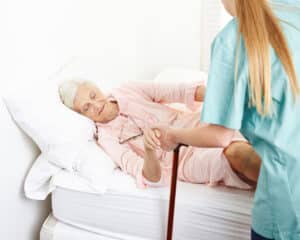Senior Care in Hillsborough CA
The side effects of chemotherapy vary from person to person. Knowing what to expect given the worst case scenario will help you prepare to help your loved one get through this difficult time in their life in the best way possible. Common symptoms include nausea and vomiting, increased bleeding and bruising, an increased risk of infection, and hair loss.
Nausea and Vomiting
Not all people taking this form of treatment experience these symptoms, and some chemotherapy drugs are more prone to cause nausea and vomiting than others. Fortunately, if your parent is suffering from one or both of these, there are several steps you and your loved one can take to minimize them.
- Suggest smaller meals and snacks throughout the day—a type of eating known as grazing. Encourage them to eat something a few hours before treatment, avoiding foods that are fried or exceptionally sweet.
- Encourage hydration by always having a glass of water near them. Unsweetened fruit juices, ginger ale and green tea are also good additions. Ginger may be taken in other forms as well such as capsules, tea, candies and ginger snap cookies.
- Have hard candies available to suck on. These might include lemon or chamomile drops. These stimulate gastric fluids which may help reduce nausea.
- Wear wrist bands designed to reduce nausea and motion sickness. These work by applying pressure to the Pericardium 6 pressure point—a pressure point found in Chinese medicine.
- Try to keep their home free of unpleasant smells which can trigger this reaction. Aromatherapy oils such as lavender, chamomile and peppermint are good scents to have on hand—really, whatever appeals to your parent. Smells can take you back to nice memories or ahead to future expectations.
- If the nausea or vomiting is severe, their doctor may prescribe an anti-nausea medication.
Bleeding and Bruising
This symptom also varies from person to person. Consider purchasing a soft-bristled tooth brush to prevent their gums from bleeding if this appears to be an issue. Be sure to apply anti-bacterial ointment and a bandage to any cuts and scrapes that do materialize as your parent will be more prone to infections during treatment.
Protecting Yourself
There are safety precautions you need to be aware of as a family caregiver. These include avoid coming into contact with bodily fluids and, when you do, wear disposable gloves. Wash their sheets, towels and clothes separately.
Senior Care Provider
A senior care provider has cared for many seniors going through the effects of chemotherapy. They can assist with the daily activities of living as well as prepare healthy meals and run errands such as grocery shopping. They can provide the support and companionship so vital during life’s challenges and provide you with the time you need to take care of yourself as you care for your aging parent.
If you or an aging loved one are considering hiring professional senior care in Hillsborough, CAhttp://avivasf.com/contact-us/, call the caring staff at Aviva In-Home Care. Call today: (415) 795-2203
- Do You Need Help with Personal Care for Your Senior? - September 16, 2019
- Causes and Risk Factors for Shingles in the Elderly - September 12, 2019
- Five Reasons Your Senior Might Need a Daily Routine - September 5, 2019




